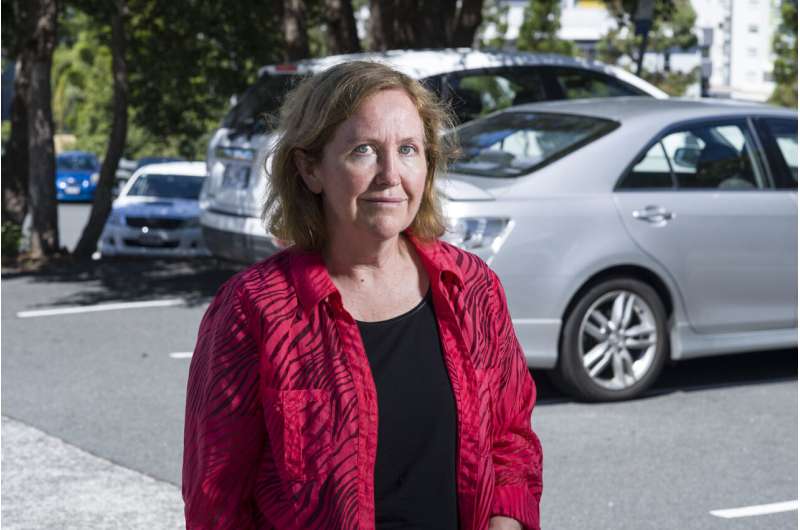Study finds most food delivery riders don't cut corners when it comes to safety

A QUT study that observed and compared 3,401 bicycle food delivery riders and private cyclists in Brisbane has found that food delivery riders generally don't take more risks on the roads—despite the huge time pressures of the gig economy and hungry customers.
The study by QUT's Center for Accident Research & Road Safety—Queensland (CARRS-Q), Risky business: Comparing the riding behaviors of food delivery and private bicycle riders, is published in the November edition of the Accident Analysis & Prevention journal.
Researchers Dr. Oscar Oviedo-Trespalacios, Dr. Elisabeth Rubie and Professor Narelle Haworth AM looked at red light running, helmet wearing and mobile phone use.
Their team of 13 observers staked out sites across five inner Brisbane suburbs (South Brisbane, West End, Newstead, New Farm and Central Brisbane) during lunchtime and dinner time peaks over six days last winter.
"Despite media and public concern, the observations did not support a view that BFDRs [bicycle food delivery riders] engage in more risky riding behaviors than private riders," the authors wrote.
"Overall, helmets were worn by 97.4% of riders (BFDRs 99.3% vs private riders 93.4%), which is very positive given the safety benefits that helmets offer in the event of a crash or fall."
First author Dr. Oviedo-Trespalacios said the research team did still witness some risky behaviors by private cyclists and bicycle food delivery riders (BFDRs)—but, overall, neither group was worse than the other.
"There has been enormous growth in the gig economy and the home delivery of meals—which was particularly accelerated during the COVID-19 lockdowns, not just in Australia, but around the world," he said.
"There is increasing evidence that food delivery on push bikes or electric bikes is an occupation with significant road safety risks, because the work pressures to get food delivered fast can encourage risky behavior.
"But the results of our study suggest carrying a food bag does not make riders more likely to run a red light, not wear a helmet or ignore other road rules.
"This doesn't mean it's all good news though.
"We witnessed plenty of risky behavior among the 2274 BFDRs and 1127 private cyclists who we observed in the inner suburbs of Brisbane during the day and night.
"Overall, 24% of all riders confronted with a red traffic or pedestrian light did not stop. Whether the rider was a BFDR or private rider had little direct influence on red light running. Instead, riding the wrong way in the traffic lane and swapping between the footpath and the road were more common among those who disobeyed signals. Long waiting times for the walk signal and bicycles not triggering traffic signals are likely to encourage riders to cross on red, particularly under time pressure.
"Helmet wearing was actually better among delivery riders—99.8% of BFDRs wore a helmet, versus 93.4% of private cyclists, and men were slightly more likely to wear a helmet than women.
"Most riders avoided handheld phone use while riding, but cradles with mobile phones were very prevalent among BFDRs. It was very difficult for our observers to see if riders were touching their phones while moving, but when they did witness it, it was more likely to be food delivery riders physically interacting with their phones than private riders."
The authors also found slight behavioral differences between delivery riders who were employees paid per hour, and those who were contractors paid per job. In particular, contractors were more likely to have a phone visible than employed riders.
"The results suggest that organizations that employ BFDRs appear to manage rider distraction better than companies that contract riders," the authors wrote.
The QUT study noted that at least six food delivery riders died in road crashes in Australia in 2020.
A New South Wales Food Delivery Safety Taskforce established after the deaths identified more than 80 serious incidents involving delivery riders over 2019 and 2020. The taskforce's conclusions included that between 4pm and 8pm was the worst danger time, and contributing factors to incidents included fatigue and time and emotional pressures.
More information: Oscar Oviedo-Trespalacios et al, Risky business: Comparing the riding behaviours of food delivery and private bicycle riders, Accident Analysis & Prevention (2022). DOI: 10.1016/j.aap.2022.106820
Provided by Queensland University of Technology



















